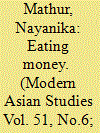|
|
|
Sort Order |
|
|
|
Items / Page
|
|
|
|
|
|
|
| Srl | Item |
| 1 |
ID:
158842


|
|
|
|
|
| Summary/Abstract |
This article has four important goals. First, I want to ask why liberalization and market-friendly reforms failed to curb corruption in India. Indeed, confounding the predictions of most proponents of reform, corruption seems to have increased after the neoliberal reforms of 1991. Second, I aim to develop a typology in which the importance of particular sectors to corrupt practices is highlighted and explained. Third, I point out that India has failed to make the ‘transition’ historically seen in low-income countries as they develop. Nation-states have in the past moved from a system of vertical corruption—marked by the extraction of small sums from a large number of transactions with citizens in everyday life—to a system of horizontal corruption, in which governmental elites extract large sums in a small number of transactions from corporate and commercial bodies. Finally, I argue that anti-corruption movements cannot be understood without paying attention to the affective and emotional ties that bind citizens to the state. We have to take account of contradictory feelings about the state: cynicism about the state and popular anger against corruption on one side, and an attachment to popular sovereignty and patronage on the other. These contradictory sentiments will better enable us to understand the conjunctures that lead to effective institutional change.
|
|
|
|
|
|
|
|
|
|
|
|
|
|
|
|
| 2 |
ID:
158840


|
|
|
|
|
| Summary/Abstract |
This article studies corruption in India through an ethnographic elaboration of practices that are colloquially discussed as the ‘eating of money’ (paisa khana) in northern India. It examines both the discourse and practice of eating money in the specific context of the implementation of the National Rural Employment Guarantee Act, 2005 (NREGA). The article works through two central paradoxes that emerge in the study of corruption and the state. The first paradox relates to the corruption–transparency dyad. The ethnography presented shows clearly that the difficulties in the implementation of NREGA arose directly out of the transparency requirements of the statute, which were impeding the traditional eating of money. Instead of corruption being the villain it turns out that, in this particular context, it was its categorical Other—transparency—that was to blame. The second and related paradox emerges from an ethnographic examination of the processes and things through which development performance, corruption, and transparency are established and adjudged in the contemporary Indian state. Corrupt state practices and transparent state functioning are authoritatively proclaimed through an assessment of evidence—material proof in the form of paper—that is constructed by the Indian state itself. The push for transparency in India at the moment is not only leading to an excessive focus on the production of these paper truths but, more dangerously, is also deflecting attention away from what is described as the ‘real’ (asli) life of welfare programmes. Ultimately, this article contends that we need to eschew treating corruption as an explanatory trope for the failure of development in India. Instead of devising ever-more punitive auditing regimes to stem the leakages of the Indian state, this work suggests that we need a clearer understanding of what the state really is; how—and through which material substances—it functions and demonstrates evidence of its accomplishments.
|
|
|
|
|
|
|
|
|
|
|
|
|
|
|
|
| 3 |
ID:
158843


|
|
|
|
|
| Summary/Abstract |
This article studies the career and writings of Sir Malcolm Darling to make three main claims. First, an intellectual genealogy of development studies is presented through the examination of close parallels between colonial efforts at rural welfare and post-colonial prescriptions for the same. Darling was central in the British efforts in Punjab to formulate ideas of reform from below or thrift among the peasantry, both of which remain popular in contemporary theories of community development and microfinance respectively. The similarities between colonial and post-colonial reforms are striking because the colonial experience remains largely forgotten. This intellectual amnesia serves a political end by blaming the peasant for his poverty and redemption from the same. Simultaneously, any structural or revolutionary social change is avoided. Secondly, the article probes the exaggerated focus on indebtedness and the political interests this served. Indebtedness gave the Unionists in Punjab political legitimacy, and the colonial state formulated solutions for the problem that did not tax its resources, for example the cooperative movement was designed to be self-financing. Finally, the article speaks to the themes of this issue by challenging the assumption that ‘institutions’ alone are a legacy of colonial rule and developmentalist reform is a post-colonial preoccupation of independent states. By presenting a case study of attempted economic and institutional reform during colonial rule, it allows one to appreciate the close, contemporaneous connections between colonial modes of governance and current modes of development.
|
|
|
|
|
|
|
|
|
|
|
|
|
|
|
|
| 4 |
ID:
158841


|
|
|
|
|
| Summary/Abstract |
This article provides a first systematic mapping of politically influential shrines across Pakistani Punjab by identifying shrine-related families that have directly participated in elections since 1937. One of the earliest entrants in the politics of pre-partition Punjab, shrine elites (pīrs) have shown remarkable persistence in electoral politics post independence. We find striking long-run continuities in the initial configuration of religion, land, and politics fostered during colonial rule and embodied in political shrines. Exploring possible mechanisms of this persistence, we emphasize the role of shifting political alliances, repeated military interventions, marital ties among shrine elites, and preservation of political brokerage. Defined by their privileged ‘origins and associations’ and organized as a group with a strong sense of solidarity around protecting common interests, the pīrs are a key component of Punjab's power elite, the study of which is central to understanding the genesis and persistence of elites and institutions.
|
|
|
|
|
|
|
|
|
|
|
|
|
|
|
|
| 5 |
ID:
158837


|
|
|
|
|
| Summary/Abstract |
Despite theoretical justifications and empirical evidence that state-owned enterprises have played an important role in late development, as well as over three decades of evidence that privatization programmes since the 1980s have had mixed results at best, international financial institutions continue prescribing privatization as a panacea for developing countries. Pakistan is an interesting case to understand why privatization is still considered desirable, because it is one of a set of developing countries that have whole-heartedly implemented Washington Consensus policies. In this context, we analyse privatization in two key economic sectors in Pakistan: energy and banking. Using qualitative and quantitative data, we describe the motivations behind these privatizations, the process by which they were carried out, and analyse the post-privatization performance of these organizations and sectors. We find that in both cases (a) the privatizations failed not only with respect to their stated aims, leading to a decline in national productive capabilities, but also had adverse distributional consequences, shifting the rewards to the buyers while the risks and costs remained with the public sector, and (b) the suboptimal outcomes of the privatizations went largely unchallenged aided by a prevalent neoliberal view amongst the country's economic policy makers and intelligentsia. Our analysis sheds new light on the process by which privatization in the absence of a state with the capacity to discipline business interests has enabled these interests to obtain state-sponsored rents without bringing any of the associated benefits for economic development.
|
|
|
|
|
|
|
|
|
|
|
|
|
|
|
|
| 6 |
ID:
158838


|
|
|
|
|
| Summary/Abstract |
India has the largest informal, unregistered economy in the world, infrastructurally backward, yet vital for both growth and livelihoods. In the first section of this article, five economic institutions that shape this economy are introduced: small firms, informality, non-metropolitan towns, innovation and innovation systems, and the state's regulative impact on the economy it does not directly regulate. In the second section, we trace the development of the commodity economy of a South Indian town taken for case study over 40 years, before exploring three kinds of innovation in the third section: invention, adaptive, and adoptive innovation. In the fourth section, the formal and informal institutions that nurture informal innovation are analysed: family business, business associations, banks and finance, informal insurance and gold, hybrid state–private institutions, and informal innovation inside the state. The conclusion confirms the innovative dynamism of the informal economy and the complex pathways of institutional change that both shape, and are shaped by, innovation.
|
|
|
|
|
|
|
|
|
|
|
|
|
|
|
|
| 7 |
ID:
158839


|
|
|
|
|
| Summary/Abstract |
There are challenging complexities in analysing both historical trends and contemporary structures in the region now comprising Pakistan. Interrelating both history and the present poses further challenges. With scholarship aligned on either side of the apparent watershed of 1947, analysts have hitherto remained negligent of a pattern of continuity and disjuncture that is explored in this article, which it is hoped will enable a deeper understanding of historical causations and outcomes. Further, we propose here that such multiple and diverse trends, while they might demand distinct empirical analyses, can coalesce within three overarching themes. Analysing these themes and their interstices, enables a more cohesive and integrated understanding of Pakistan's complex realities than has been hitherto forthcoming from the more segmented approaches that dominate discourse on the study of Pakistan's past and present. The author aims to shed light on why and how retardation in Pakistan is so resilient, and hopes that understanding these long-term outcomes will be greatly assisted by an analytical approach predicated on three themes: thwarted nationalism, economic counter-revolutions, and anarcho-vassalage.
|
|
|
|
|
|
|
|
|
|
|
|
|
|
|
|
| 8 |
ID:
158836


|
|
|
|
|
| Summary/Abstract |
I examine decentralization through the lens of the local dynamics it unleashed in Bangladesh. I argue that the national effects of decentralization are largely the sum of its local-level effects. Hence, to understand decentralization, we must first understand how local government works. This implies analysing not only decentralization, but also democracy, from the bottom up. I present a model of local government responsiveness as the product of political openness and substantive competition. The quality of politics, in turn, emerges endogenously as a joint product of the lobbying and political engagement of local firms/interests, and the organizational density and ability of civil society. I then test these ideas using qualitative data from Bangladesh. The evidence shows that civic organizations worked with non-governmental organizations and local governments to effect transformative change from the grass roots upwards—not just to public budgets and outputs, but to the underlying behaviours and ideas that underpin social development. In the aggregate, these effects were powerful. The result, key development indicators show, is Bangladesh leap-frogging past much wealthier India between 1990 and 2015.
|
|
|
|
|
|
|
|
|
|
|
|
|
|
|
|
|
|
|
|
|